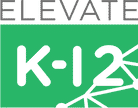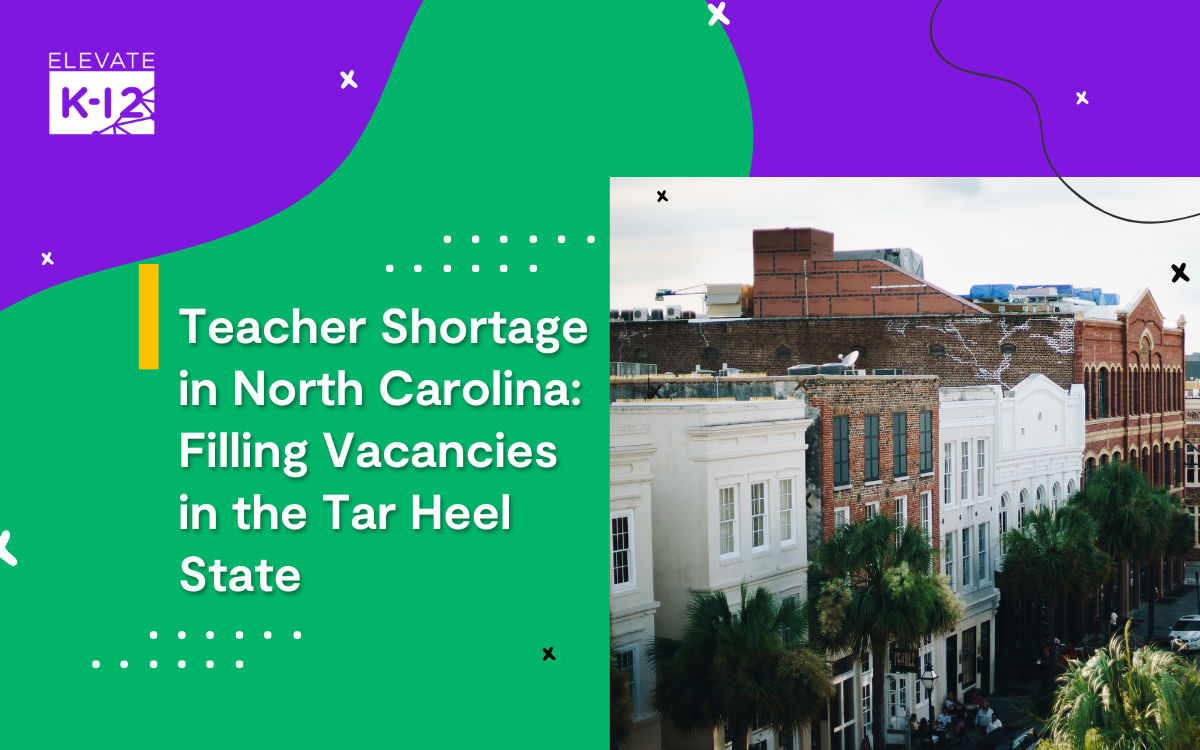The North Carolina public education system has faced a teacher shortage crisis for years. With the eleventh-worst teacher shortage in the country, the state has a lot of catching up to do.
Teacher shortages lead to bigger class sizes, uncertified teachers filling vacancies, overworked educators, and less time and attention for students. However, with so many unfilled vacancies, districts are left wondering where to start.
Causes of North Carolina’s Teacher Shortage
North Carolina faces a number of complex factors contributing to their teacher shortage. Low pay and lack of respect for teachers have led to high attrition rates and a reduction in new graduates joining the teaching profession.
Burnout and Attrition
The toll of pandemic-era burdens was enough to push many teachers to switch careers or retire early. Since the pandemic’s peak, schools have dealt with students who are behind academically, socially, and emotionally.
Add in a tough economy that squeezes the low pay of teachers to the limit, as well as political culture wars focused on schools, and many teachers don’t want to stay teachers.
Alex Johnson, a special education teacher in Wake County, North Carolina, said, “I want to stay in the education realm, but I do not think I could stay in the classroom … It’s exhausting.”
When burnout causes teachers to leave the profession after less than a decade, schools are left with more vacancies than they can hope to fill.
Teacher Pay Below the National Average
North Carolina is 33rd in the nation for teacher pay. The average teacher salary in North Carolina was $54,150 in 2019–2020 — $10,000 less than the national average. In 2023, a teacher’s starting salary was $37,000, while the average cost of living is more than $43,000.
The extremely low pay makes it difficult for North Carolina to compete with other states for new teacher recruits. The low pay not only drives people out of the profession who can no longer live off their salaries, but also discourages new recruits from joining the field.
Lack of Support for Teachers From Policymakers
Current budget proposals will only raise beginner teachers’ salaries to $41,000, still not matching the cost of living. Experienced teachers will only get a raise of 3.6%. Despite advocacy from school districts, lawmakers seem resistant to paying teachers more.
Meanwhile, lawmakers are expanding private school voucher programs, funneling taxpayer money to private ventures instead of public schools. North Carolina spent $133 million on these vouchers in 2023 and plans to spend more in the future.
Lack of Respect for the Profession
Lawmakers unwilling to pay educators a fair wage have made teachers feel highly disrespected. Pricilla Greene, a new teacher in Asheville, said, “For the state to say we don’t deserve enough money to operate as we should is highly insulting and disrespectful.”
Culture wars around schools have also subjected teachers to attacks from parents, including scrutiny around teaching curriculums and accusations of “indoctrination” on social media. The political climate is stressful for teachers, makes interactions with parents more challenging, and distracts lawmakers from helping schools.
Many teachers are now afraid of unwarranted criticism or even getting fired. They have censored themselves in the classroom or avoided speaking out — and some have left the profession altogether.
How Many Teacher Vacancies Are There in North Carolina?
North Carolina school systems had 2,840 teaching vacancies at the start of the 2023–2024 school year, accounting for 3% of all positions.
Some districts fare worse than others, with 13 districts facing over 50 empty teaching positions. Different age groups also face varying vacancy numbers, with elementary schools having a more difficult time recruiting than high schools.
Is the Teacher Shortage Going To Get Worse?
The teacher shortage in North Carolina might get even worse. One of the biggest cases in North Carolina’s educational history was Leandro v. North Carolina. The case, filed by five school districts in low-wealth counties, claimed that North Carolina did not uphold its duty to provide an equal education to all students.
Those districts were under-resourced compared to wealthier districts. The North Carolina Supreme Court ruled in favor of the districts, obligating the state to provide more support to these low-wealth districts.
While these districts are still unable to match the per-pupil spending of wealthier areas, the ruling allowed them to hold the state accountable for meeting students’ educational needs. Now, the North Carolina Supreme Court has decided to rehear the case.
The implications if the case is overturned are substantial. If the state is not obligated to provide resources to low-wealth districts, pay and working conditions for teachers will suffer. The inequity will only get wider, and attrition in those districts will increase, making the teacher shortage even worse.
Solutions for Addressing the Teacher Shortage in North Carolina
Some solutions to teacher shortages are obvious — better pay and working conditions tempt more teachers into the classroom. However, administrators and the board of education have gotten creative with filling shortages when they lack the resources.
1. Increasing Teacher Salaries
Increasing teacher salaries statewide is one of the most urgent solutions lawmakers need to consider.
Democratic and Republican lawmakers in 26 states have proposed salary increases, and research shows that raises will reduce attrition rates. However, they need to be significant to keep up with inflation and make a real difference in teacher retention.
2. Making Certification Programs More Affordable and Accessible
Although student loan forgiveness after ten years of service helps offset the cost of teacher education, the upfront cost of training and certification is still a barrier to entry. However, the state is experimenting with opening up new, more affordable paths to certification.
For example, North Carolina introduced the option for teachers to get certified at more affordable community colleges.
Central Piedmont Community College’s Teacher Preparation Program allows teachers to complete a two-year residency at an elementary school while taking two courses a semester. The residency will include mentorship from experienced teachers. The total cost? $2,500.
These programs will make licensure significantly more affordable, and the mentorship model may reduce burnout and keep teachers in North Carolina schools for longer.
3. Improving Working Conditions
With strict working hours, a lack of flexibility, and high workloads, it’s hard for public schools to compete with professions that offer remote, flexible work. Not to mention, burnt-out teachers bring less energy and passion into their classrooms.
School districts can make a difference in the lives of teachers — and attract new recruits to the profession — by improving working conditions for teachers.
Schools can start by introducing new ways for teachers to work part-time and set their work hours. They can make a massive difference in teachers’ work-life balance by offering remote work options and finding ways to reduce workloads.
Elevate offers teachers a better work-life balance through our virtual live teaching model. Our teachers enjoy flexibility and zero commutes. We also provide our teachers with lesson plans created by our in-house curriculum experts — significantly reducing workloads.
Our model includes paraprofessional support in each classroom, which also helps our teachers feel supported in their day-to-day work lives.
4. Remove Geographic Constraints From Hiring by Using Modern Technology
Geographic constraints make it more difficult for school districts to fill vacancies. For example, a qualified teacher living in Charlotte might not be able to commute to Raleigh — but if the teacher works remotely, they can fill a Raleigh vacancy.
Elevate has already made this a reality in over 500 districts. We provide technology and software that facilitates engaging and meaningful live interactions between teachers and students. Our service creates positive student outcomes in districts experiencing teacher shortages.
Find Out How Elevate Is Already Fighting the Teacher Shortage in North Carolina
Twenty-eight districts (and counting) in North Carolina are already working with Elevate to address teacher shortages, including Durham Public Schools and Richmond County Schools. We offer over 140 courses, including hard-to-fill options like special education, math, and more.
Using qualified teachers in a live synchronous environment helps attract great teachers who want to work remotely. Plus, students can experience working with engaging, fun teachers in courses your school might not otherwise be able to offer.

